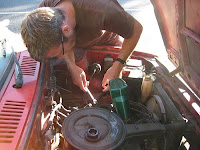Utilizamos generalmente la palabra «adjetivo» para describir palabras con las cuales podemos hacer referencia a una cualidad de un sustantivo o de un pronombre, por ejemplo:
La mayoría de los adjetivos pueden ser utilizados de dos maneras: deforma atributiva, precediendo al sustantivo que acompañan y de forma predicativa ubicándolo a continuación del verbo, por ejemplo:
Susan es una joven mujer.
Peter and Tom are good pupils. (Atributiva)
Peter y Tom son buenos alumnos.
They are beutiful girls. (Atributiva)
Ellas son muchachas hermosas.
Mary is intelligent. (Predicativa)
Mary es inteligente.
You are sad. (Predicativa)
Tu estás triste.
The ice cream is delicious. (Predicativa)
El helado está delicioso.
Los adjetivos en inglés son invariables en cuanto a género y número, sin importar si el sustantivo al cual acompañan está en singular o plural, por ejemplo:
El hombre inteligente
The intelligent men
Los hombres inteligentes
The beautiful girl
La hermosa muchacha
The beautiful girls
La hermosas muchachas
También existe la posibilidad de que varios adjetivos acompañen a unmismo sustantivo y para eso usualmente se respeta el siguiente orden:












